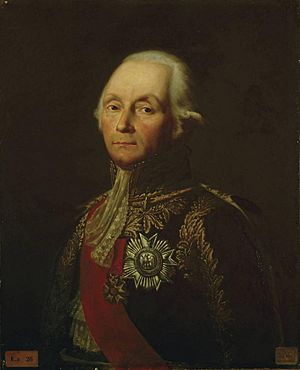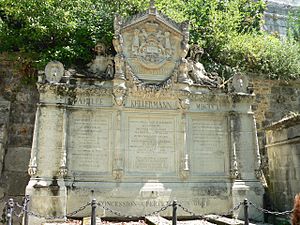François Christophe de Kellermann facts for kids
Quick facts for kids
Marshal of the Empire
François Christophe de Kellermann
Duke of Valmy
|
|
|---|---|

Kellermann as Marshal of the Empire, after a contemporary portrait by Antoine Ansiaux
|
|
| Born | 28 May 1735 Strasbourg, France |
| Died | 23 September 1820 (aged 85) Paris, France |
| Allegiance | |
| Service/ |
Army |
| Rank | Marshal of the Empire |
| Awards | Grand Cross of the Legion of Honour Order of the Red Eagle Grand Cross of the Order of the Württemberg Crown Grand Dignitary of the House Order of Fidelity Grand Cross of the Order of Saint Louis |
François-Étienne-Christophe Kellermann (born May 28, 1735 – died September 23, 1820) was a famous French military leader. He was also known as the 1st Duke of Valmy. Kellermann served as a high-ranking general and later became a Marshal of the Empire. He played important roles in two major conflicts: the French Revolutionary Wars and the Napoleonic Wars. His name is even carved on the Arc de Triomphe in Paris, honoring his achievements.
Contents
Early Life and Family Background
François Christophe de Kellermann came from a family with roots in Saxony, a region in Germany. His family had lived in Strasbourg, France, for a long time and had been given a special noble status. He was the only son of François de Kellermann and Baroness Marie Magdalene von Dyhrn.
Joining the Army: Before the Revolution
At just 15 years old, François Kellermann joined the French Army. He started as a volunteer in a hussar (light cavalry) regiment. He quickly moved up the ranks. By 1758, during the Seven Years' War, he was a captain. He showed great skill by capturing 300 enemy soldiers with only a small group of cavalry.
In 1771, Kellermann served in Poland and received an award called the Order of Saint-Louis. He continued to be promoted, becoming a major in 1779. By 1784, he was a brigadier-general, and the next year, a marechal-de-camp, which was a very senior rank. Kellermann was the only one of Napoleon's future marshals to reach such a high position before the French Revolution.
Serving During the French Revolution
When the French Revolution began in 1789, Kellermann was very supportive of its goals. In 1791, he became a general in the army in Alsace. The next year, in August 1792, he got the chance to make history.
The Battle of Valmy
Kellermann led the French army to a major victory against the Prussians at the Battle of Valmy. This battle was incredibly important. The famous writer Johann Wolfgang von Goethe said it "opened a new era in the history of the world." Even Napoleon later praised Kellermann's bravery at Valmy.
After Valmy, Kellermann was moved to lead the army on the Moselle. He faced some challenges and was even accused of not supporting other generals. However, he was found innocent by the National Convention in Paris. He was then put in charge of the army in the Alps and Italy. Here, he proved to be a careful leader and a good organizer.
Imprisonment and Return to Duty
Later, Kellermann was ordered to take control of Lyons, a city that was rebelling against the government. After the city surrendered, he was wrongly imprisoned in Paris for 13 months. But once again, he was found innocent and given back his command. He did a great job defending the southeastern border against the Austrians until his army joined forces with General Napoleon Bonaparte's army in Italy.
Service Under the French Empire
By this time, Kellermann was 62 years old. While he was still capable, younger generals were now leading the way with new fighting methods. So, Kellermann's time as an active battlefield commander ended. However, he was never forgotten for his heroism at Valmy.
When Napoleon became the leader of France, he honored Kellermann. Kellermann became a senator in 1800 and president of the Senate in 1801. On May 19, 1804, he was given the honorary title of Marshal of France. In 1808, he was made the Duke of Valmy.
During the First French Empire, Kellermann often helped with army administration and training. He also managed supply lines and commanded reserve troops. His many years of experience made him a very valuable helper to Napoleon.
In 1814, Kellermann voted to remove Napoleon from power. He then became a peer (a noble with special rights) under the new king, Louis XVIII. After Napoleon's brief return to power (known as the "Hundred Days"), Kellermann continued to serve in the Chamber of Peers and supported Liberal ideas.
Later Life and Legacy
Marshal Kellermann passed away in Paris on September 23, 1820. He was buried in the famous Père Lachaise Cemetery.
His son, François Étienne de Kellermann, also became a cavalry general and fought for Napoleon. Kellermann's grandson, François Christophe Edmond de Kellermann, became a politician.
See also
 In Spanish: François Christophe Kellermann para niños
In Spanish: François Christophe Kellermann para niños


